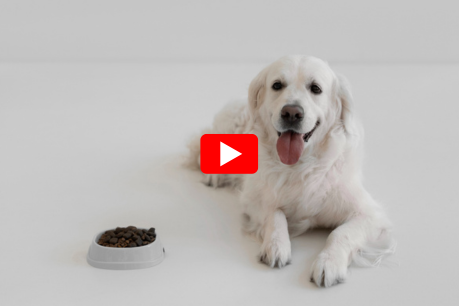Psyllium Husk For Dogs Benefits: Improve Digestion & Health!
As pet owners, we are always on the lookout for natural ways to support the health and well-being of our dogs. One such natural ingredient gaining popularity is psyllium husk.
Derived from the seeds of the Plantago ovata plant, psyllium husk is a rich source of soluble fiber that offers numerous benefits not just for humans but for our canine companions as well.
Psyllium husk supports dogs’ digestion, eases constipation, regulates blood sugar, and promotes healthy weight by adding fiber to their diet naturally.
In this article, we will explore the many benefits of psyllium husk for dogs, how it works, appropriate usage, and important considerations to keep your furry friend happy and healthy.
What Is Psyllium Husk?
Psyllium husk is the outer coating of the seeds from the Plantago ovata plant. It is a natural soluble fiber that absorbs water and forms a gel-like substance when mixed with liquids.
This fiber is well-known for its ability to support digestive health by regulating bowel movements and easing both constipation and diarrhea.
While widely used in human health for managing cholesterol, blood sugar, and digestive disorders, psyllium husk is also beneficial for dogs, especially for those with digestive issues.
Key Benefits of Psyllium Husk for Dogs
Promotes Healthy Digestion and Relieves Constipation
One of the primary benefits of psyllium husk for dogs is its ability to promote digestive health. Dogs suffering from constipation or irregular bowel movements can benefit greatly from the addition of psyllium to their diet.
The soluble fiber in psyllium absorbs water in the gut, softening the stool and making it easier for your dog to pass.
Unlike some laxatives, psyllium works naturally by increasing stool bulk without irritating the intestines. This makes it a gentle yet effective remedy for constipation. Regular use may help keep your dog’s digestive system functioning smoothly.
Regulates Diarrhea
In cases of diarrhea, psyllium husk can also play a helpful role. The gel-forming fiber absorbs excess water in the intestines, helping to firm up loose stools.
This property allows psyllium to regulate bowel consistency, reducing the frequency and severity of diarrhea episodes.
However, it’s important to consult a vet before using psyllium for diarrhea to ensure the cause is not due to infections or other serious health problems.
Supports Weight Management
Adding fiber such as psyllium husk to a dog’s diet can promote a feeling of fullness, which may help with weight control.
For overweight dogs, psyllium can be a useful aid in appetite regulation by making your dog feel satisfied with less food.
Fiber also slows down digestion, helping to regulate blood sugar levels and reduce fat absorption, which can contribute to a healthier weight.
Helps Maintain Healthy Blood Sugar Levels
Soluble fiber like psyllium slows the absorption of sugars from the digestive tract. This can help moderate blood sugar spikes after meals. Dogs with diabetes or those prone to blood sugar issues may benefit from this natural blood sugar regulation.
This benefit is particularly valuable for dogs that are overweight or have metabolic disorders, where stable blood sugar is essential for overall health.
Supports Colon Health
Psyllium husk encourages regular bowel movements, which helps to keep the colon clean and healthy. Regular elimination of waste reduces the risk of toxin buildup and inflammation in the intestines.
By maintaining a healthy colon environment, psyllium can contribute to better nutrient absorption and overall well-being in dogs.
Natural and Safe Fiber Source
Unlike some chemical laxatives or stool softeners, psyllium is a natural plant-based fiber that is generally safe for dogs when used correctly. It is non-toxic and usually well-tolerated, making it an excellent choice for long-term digestive support.
How Psyllium Husk Works in a Dog’s Body
When psyllium husk is ingested, it travels through the digestive tract without being digested. Because it is highly absorbent, it attracts and holds water, forming a bulky gel-like substance in the intestines.
This gel increases stool volume and moisture, stimulating bowel contractions that facilitate smoother stool passage.
The gel also slows down digestion, allowing more time for nutrient absorption and stabilizing blood sugar levels. In cases of diarrhea, the fiber binds excess water, helping firm up stool consistency.
How to Use Psyllium Husk for Dogs
Dosage
The correct dosage of psyllium husk for dogs varies depending on size, weight, and the specific health issue. A general guideline is:
-
Small dogs (under 15 lbs): 1/4 teaspoon per day
-
Medium dogs (15-50 lbs): 1/2 to 1 teaspoon per day
-
Large dogs (over 50 lbs): 1 to 2 teaspoons per day
It’s best to start with a small amount and gradually increase to avoid digestive upset. Always mix psyllium husk with plenty of water or wet food to prevent choking or blockages.
Administration Tips
-
Mix psyllium husk powder with your dog’s food or water.
-
Ensure your dog drinks plenty of fresh water throughout the day to help the fiber do its job.
-
Use psyllium husk only under the guidance of a veterinarian, especially for long-term use or in dogs with pre-existing conditions.
Important Considerations and Precautions
While psyllium husk is generally safe, there are some precautions to keep in mind:
-
Hydration: Since psyllium absorbs water, your dog must have access to plenty of fresh water to avoid intestinal blockage or choking.
- Allergic Reactions: Though rare, some dogs may be allergic or sensitive to psyllium. Watch for signs of itching, swelling, or digestive upset.
-
Underlying Health Issues: Diarrhea or constipation can be symptoms of serious diseases. Always consult a vet to rule out infections, blockages, or other medical conditions before starting psyllium.
-
Medication Interactions: Psyllium may affect absorption of certain medications. Give psyllium a few hours apart from other oral drugs.
-
Not a Substitute for Veterinary Care: Psyllium is a supplement to aid digestion but should not replace professional veterinary diagnosis or treatment.
Other Natural Ways to Support Your Dog’s Digestive Health
While psyllium husk is beneficial, a holistic approach can improve your dog’s digestion and overall health:
-
Balanced Diet: Feed a diet rich in high-quality proteins, healthy fats, and fiber from vegetables.
-
Probiotics: Adding probiotics can promote healthy gut bacteria and improve digestion.
-
Regular Exercise: Physical activity stimulates intestinal movement and supports metabolic health.
-
Hydration: Always provide fresh water to aid digestion and prevent dehydration.
Conclusion
Psyllium husk is a natural, plant-based fiber with many benefits for dogs, especially those dealing with digestive issues like constipation, diarrhea, or irregular bowel movements. It can also support weight management, blood sugar regulation, and overall colon health.
Used appropriately and under veterinary guidance, psyllium husk can be a valuable addition to your dog’s diet to promote digestive wellness. Always ensure your dog has plenty of water when taking psyllium and monitor for any adverse reactions.
If you notice persistent digestive problems or other symptoms, consult your veterinarian promptly for a thorough evaluation.
References Link
- Plantago ovata
https://en.wikipedia.org/wiki/Plantago_ovata
- Fiber for Pets
https://www.aspca.org/pet-care/animal-poison-control/toxic-and-non-toxic-plants/fiber-pets
- Fiber in Dog Diets
https://veterinarypartner.vin.com/default.aspx?pid=19239&id=4951754
.



